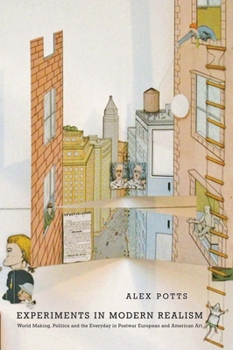Experiments in Modern Realism: World Making, Politics and the Everyday in Postwar European and American Art
This major study offers a new understanding of the aesthetics and politics of postwar European and American art. Questioning the widespread assumption that the most innovative practices were non-representational, it shows how a powerful realist impulse operated alongside a strong commitment to abstraction. Alex Potts makes the case that the ambition to create work that engaged with the everyday and political realities of the world motivated much...
Format:Hardcover
Language:English
ISBN:0300187688
ISBN13:9780300187687
Release Date:August 2013
Publisher:Yale University Press
Length:320 Pages
Weight:2.90 lbs.
Dimensions:1.5" x 6.5" x 9.4"
Customer Reviews
0 rating





